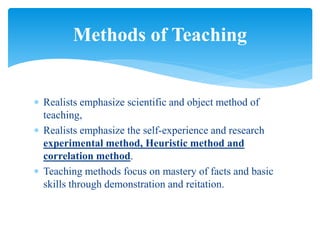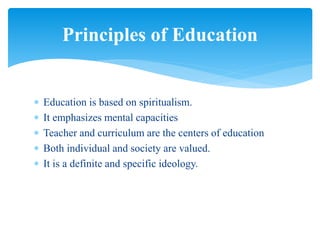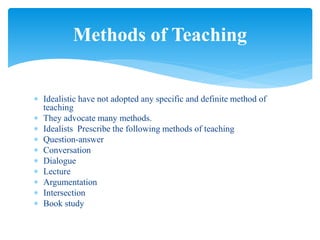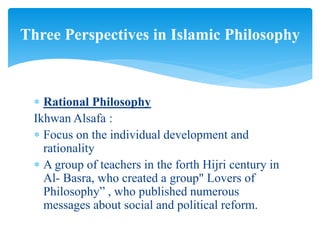Islamic and Philosophical Foundation of Education
- 1. Realism Idealism Islamic Philosophy of Education Contribution of Philosophy Presented By: Zaheer Abbas Umair Mehmood Farukh Javed Topics
- 2. Realism, Idealism & Islamic Philosophy: Principle of Education Aims of Education Curriculum Teacher Method of Teaching School Content
- 3. Realism Vs Idealism Realism Established by Aristotle Claims Objects outside mind have existence Objects outside mind are independent Items exist regardless of human perception and their existence does not depend on human perception Physical World alone is Objective Knowledge acquired through senses only is real Universe is independent of ideas Things exist whether or not the human mind perceives them. Idealism • First established by Plato • Matter doesn’t exist • External world-Construction of mind • Reality consists exclusively of “ideas” • Reality is due to the sensory abilities of the human mind and not because reality exists in itself • Rejects the idea that objects are independent of our minds.
- 4. Established by Aristotle Claims Objects outside mind have existence Objects outside mind are independent Items exist regardless of human perception and their existence does not depend on human perception Physical World alone is Objective Knowledge acquired through senses only is real Universe is independent of ideas Things exist whether or not the human mind perceives them. REALISM
- 5. Education is based on science only. Emphasizes on behavior and experiment. Child and his present life are the centers of education. It opposes book learning Both the individual and the society are valued. It is liable to change according to a change in life. Principles of Education
- 6. Preparing the child for a real life. Developing the physical and mental powers of child. Preparing the child for a happy life Developing and training of senses. Acquainting the child nature and social environment Imparting vocational education Aims of Education
- 7. Realistic curriculum is developed according to utility and needs Subjects concerning day to day activities are included in curriculum Main subjects of Realistic Curriculum are (National sciences, Biological sciences, Physical sciences, Health culture, Physical exercises, Math Geography, History, Astronomy, Sports etc. Curriculum should be scientifically approached, standardized, and distinct discipline based Character is developed through training in the rules of conducts. Curriculum
- 8. Realists emphasize scientific and object method of teaching, Realists emphasize the self-experience and research experimental method, Heuristic method and correlation method. Teaching methods focus on mastery of facts and basic skills through demonstration and reitation. Methods of Teaching
- 9. Teacher’s role is supreme because he brings the child in touch with the external realities of life Keeping aside his own views, the teacher imparts scientific knowledge to the child in an easy and effective way. Teacher
- 10. According to Realism, school is a socially well-planned institution It is mirror of Society. School
- 11. • First established by Plato • Matter doesn’t exist • External world-Construction of mind • Reality consists exclusively of “ideas” • Reality is due to the sensory abilities of the human mind and not because reality exists in itself • Rejects the idea that objects are independent of our minds. Idealism
- 12. Education is based on spiritualism. It emphasizes mental capacities Teacher and curriculum are the centers of education Both individual and society are valued. It is a definite and specific ideology. Principles of Education
- 13. Self-realization or exaltation of personality Spiritual development Realization of truth, beauty and goodness Conservation promotion and transmission of cultural heritage. Aims of Education
- 14. Idealistic curriculum is developed according to ideals and eternal vales Humanistic subjects are emphasized Intellectual- Language, Literature, History, Geography, Mathematics and Science Aesthetic-Art and Poetry Moral- Religion and Ethics Curriculum
- 15. Idealistic have not adopted any specific and definite method of teaching They advocate many methods. Idealists Prescribe the following methods of teaching Question-answer Conversation Dialogue Lecture Argumentation Intersection Book study Methods of Teaching
- 16. Supreme and important place of teacher. The teacher as a gardener knows best as to how to care and develop a child like a plant. Teacher
- 17. According to idealism school is the only place for regular and effective education School is an ideal of pleasing and joyful activities for children. School
- 18. “The pessimist complains about the wind; the optimist expects it to change; the realist adjusts the sails.”
- 19. Relationship between man and universe -> harmony not conflict. Guides to happy life committed to virtue, purity, justice, and peace. Leads to obeying Allah’s commands Other pillars of faith depends on pure monotheism Islamic Philosophy in Education
- 20. Rational Philosophy Ikhwan Alsafa : Focus on the individual development and rationality A group of teachers in the forth Hijri century in Al- Basra, who created a group" Lovers of Philosophy” , who published numerous messages about social and political reform. Three Perspectives in Islamic Philosophy
- 21. Conservative Religious Al-Gazzali: more religious explanation of education Pragmatic Ibn Khaldoun: Use of knowledge to build the Islamic nation
- 22. Principles of Education in Islam
- 23. The ultimate goal for creating mankind: To know and worship Allah ” “ُجبْالل ونُتُبْْقعَلْعَخ ْاعَمْعَنو”ْاللعَنو ل َّن”َسَسنْعإ”ل ل َّال”ونوننُدُونبُبْعْعَي” Prepare Muslim youths in a balanced way (life and after-life) Develop goodness, piety, fear of Allah in the individual, tolerance, brotherhood, love, rightness, ability of self- expression and shouldering responsibility, opportunity to the individual to live an ideal, pure and happy life. Purposes of Education
- 24. Curriculum: based on Holy Quran and Sunna Religious and intellectual Islamic education deals with all field of knowledge. Curriculum
- 25. Dialogue, induction, déduction,personal expérience, intuition,discussion, note- taking, and analogy Ethics: Islamic ethics in curriculum, morals, teaching and managing the classroom. Practical application of knowledge Teaching Methods
- 26. Teachers: inheritors of prophets' knowledge ” “النببياء ورثة العلماء Teachers’ morals= affect students’ behaviors Al-Gazzali: teachers should display strong commitment to Islamic ethics and values. Teachers’ motivation and ethics More responsibilities; honest; loyalty for the job=Allah Deal better with students; humility, brotherhood; shouldering the responsibility Teach students to use reasoning= everything is created for a reason= reflect on the universe; evidence Role of the Teacher
- 27. Students: seekers of knowledge & obligated to learn Al-Gazzali: Learner should display total commitment to learning Role of the Learner
- 28. Mother of all Education Provide base for education Introduced Progressive education Involves cultural History It give direction to education Innovate new ways It is evolutionary Process It forms methods and framework of education Contribution of philosophy in Education




























